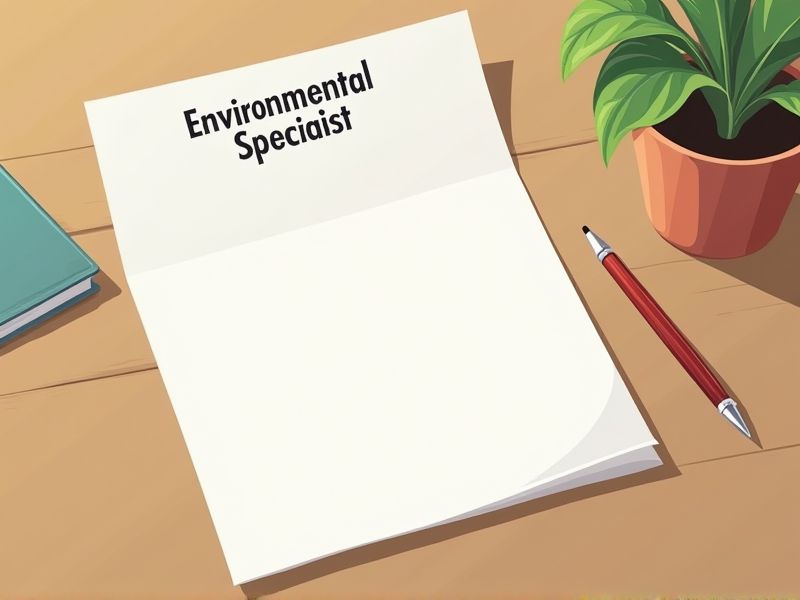
Environmental Specialists play a crucial role in safeguarding ecological stability, necessitating a blend of knowledge, skills, and official recognition through certain certifications. These certifications validate expertise in regulation compliance, risk assessment, and sustainable practices, which are vital for mitigating environmental impacts. Certification also ensures specialists remain updated with evolving laws and technologies, significantly influencing career progression and credibility in the field. Below are some significant certifications that Environmental Specialists may require.
Certified Environmental Professional (CEP)
Employing a Certified Environmental Professional (CEP) enhances an organization's credibility by ensuring the specialist has undergone comprehensive training and rigorous certification. This certification typically aligns professionals with current regulations and industry best practices, resulting in more effective project compliance and sustainability. The CEP qualification often leads to improved risk management by equipping specialists with the skills to identify and mitigate environmental hazards. Organizations hiring CEPs can potentially reduce liability and improve stakeholder trust, given the expert's proven proficiency in addressing environmental challenges.
Certified Hazardous Materials Manager (CHMM)
Obtaining the CHMM certification equips an Environmental Specialist with advanced skills in handling hazardous materials safely. Knowledge from the CHMM program ensures compliance with regulatory standards, reducing the risk of legal issues and fines. The certification enhances an Environmental Specialist's ability to assess and mitigate environmental risks effectively. Employers often prioritize hiring CHMM-certified professionals, leading to greater career opportunities and advancement.
Certified Industrial Hygienist (CIH)
A Certified Industrial Hygienist (CIH) is needed for an Environmental Specialist to ensure workplace safety by identifying and mitigating hazardous exposures to chemicals, biological agents, and physical conditions. Their specialized training and expertise assist in the accurate assessment and control of potential health risks, which enhances compliance with regulatory standards. A CIH's insights are crucial for the development and implementation of effective workplace monitoring and health protection programs. Their involvement supports overall organizational goals by reducing liability and promoting a safer work environment.
Registered Environmental Health Specialist (REHS)
The role of a Registered Environmental Health Specialist (REHS) is critical because they possess specialized knowledge in assessing and managing the health impacts of environmental factors, including air and water quality, on communities. Their expertise ensures compliance with health and safety regulations, which helps prevent disease outbreaks and contamination incidents. By conducting routine inspections and risk assessments, REHS professionals help identify potential environmental hazards before they can affect public health. Their certification demonstrates a commitment to continuous education, enabling them to address evolving environmental health challenges with the latest scientific insights.
LEED Accredited Professional (LEED AP)
Obtaining LEED AP certification equips an Environmental Specialist with comprehensive knowledge of sustainable building practices, enhancing their ability to contribute effectively to eco-friendly projects. This credential can lead to increased project efficiency and satisfaction due to its alignment with recognized green building standards. Possessing LEED AP status may also offer a competitive edge in the job market as more organizations prioritize sustainable development. Furthermore, the expertise gained through LEED accreditation supports the overarching goal of reducing environmental impact and promoting sustainable community practices.
Certified Safety Professional (CSP)
The Certified Safety Professional (CSP) credential enhances an environmental specialist's ability to manage risks, ensuring compliance with health and safety regulations. Possessing a CSP certification often results in improved job opportunities, as employers seek professionals with verified safety expertise. The certification process equips specialists with advanced knowledge, sharpening their skills in hazard assessment and mitigation. Earning a CSP also signifies a commitment to ongoing education and adherence to best industry practices in environmental safety.
Certified Environmental Auditor (CEA)
Environmental regulations have become increasingly stringent, necessitating professionals who can efficiently navigate legal frameworks; CEA certification provides that expertise. The evolution of sustainable practices demands a robust skill set in auditing environmental impacts, which a CEA offers. Businesses face rising pressure to demonstrate environmental accountability, and a CEA helps ensure compliance and credibility. Data shows that companies with CEAs are more successful in identifying and mitigating environmental risks, ensuring long-term sustainability.
Certified Pollution Prevention Specialist (CPPS)
An Environmental Specialist equipped with a CPPS designation has a deeper understanding of techniques to reduce or eliminate pollutants, effectively enhancing workplace sustainability. This certification provides knowledge on the latest environmental regulations, ensuring compliance and minimizing legal risks. With CPPS training, specialists are better prepared to implement cost-saving pollution prevention measures. Companies benefit as their environmental footprint decreases, highlighting a commitment to corporate social responsibility.
OSHA 30-Hour General Industry Certification
The OSHA 30-Hour General Industry Certification equips an Environmental Specialist with comprehensive knowledge about workplace safety standards and regulations, reducing the likelihood of safety violations. This certification enhances the specialist's ability to identify and mitigate potential hazards in diverse industrial settings, which is vital in maintaining compliance with federal safety laws. Through the training, specialists gain expertise in effectively implementing safety and health programs, directly impacting the reduction of workplace incidents. The certification can also increase an Environmental Specialist's employment prospects as it demonstrates a commitment to fostering a safe and compliant work environment.
Environmental Management Systems Lead Auditor Certification
Implementing an Environmental Management Systems (EMS) Lead Auditor Certification enhances an Environmental Specialist's ability to evaluate and improve organizational compliance with environmental regulations, thereby reducing legal risks. This certification equips specialists with the skills needed to conduct thorough audits, identifying areas for sustainable operational improvements. Holding such a certification signals a commitment to environmental best practices, increasing professional credibility and job opportunities. The certification fosters a deeper understanding of global environmental standards like ISO 14001, facilitating alignment with international practices.
Summary
By obtaining certifications, you enhance your employability as an Environmental Specialist, potentially leading to new job opportunities. The certifications often validate advanced skills, which can result in increased responsibilities and a more rewarding career path. Employers tend to recognize and appreciate certified specialists, which can translate to higher compensation and better job security. The expertise gained from certification often empowers you to make a significant positive impact on environmental projects.
